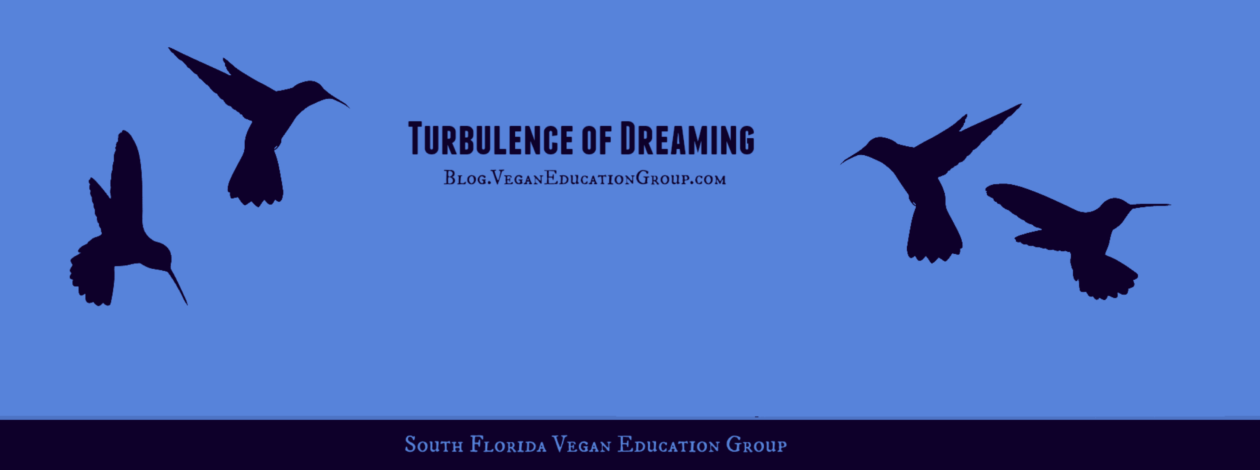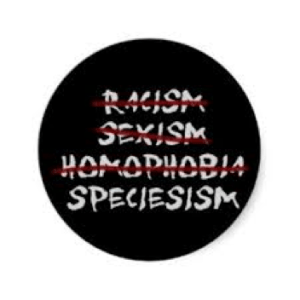
[We encourage all readers to click the blue links embedded in this essay and explore the information on those sites. Also, please read our Disclaimer regarding external sites, organizations, individuals, etc.]
Written by Elena Brodskaya and Keith Berger, co-founders, South Florida Vegan Education Group
A common question I’m asked when non-vegans find out I’m vegan is “You must have cravings, don’t you?”
Why yes, I do.
Now, I could take this opportunity to describe how I’ve been able to find wonderfully delicious veganized versions of practically every non-vegan foodstuff I once enjoyed eating before I began living vegan, but there are easily hundreds of blogs and other websites devoted to extolling the tummy-tempting virtues of thriving on food made entirely from plants, so I’ll pass. Instead, I’ll tell you what this vegan craves every… single… day.
I crave justice, fairness and basic respect for the vulnerable non-human victims of systematic oppression who are exploited and killed by the billions each year for human pleasure, comfort, convenience and entertainment.
I crave a world in which that shit is no longer normalized, tolerated and marketed as acceptable and desirable via cultural conditioning, tradition, emotional attachment and pseudoscience.
I crave an enlightened society that teaches its younger generations to treat themselves and those around them, regardless of species or any other arbitrary characteristic, with the respect and unconditional love they deserve merely by virtue of each individual’s inherent sentience rather than teaching them to devalue life.
I crave the dismantling of speciesism, the most egregious and deadly form of violent oppression our global society has ever known, until it is nothing more than an ugly scar on our collective heart and a dark stain on the tapestry of our lives, ever reminding us of a barbaric past we ought never repeat.
I crave a worldwide tidal wave of ethical integrity to wash over the planet and bring people’s behaviors into alignment with their morals so that nonviolence toward ourselves and others is the order of the day.
I crave an end to the self-centered fear endemic to humans that causes individuals and groups to claim false “superiority” over others resulting in the wrongful domination, subjugation, exploitation, humiliation and extermination of those individuals and groups deemed “inferior”.
I crave a time when there is no longer a need to convince goodhearted, rational people that it is wrong to hurt and kill others for their own benefit because they will have already learned to live in accordance with their inherent understanding of right and wrong.
Oh, and soft pretzels. I crave soft pretzels like nobody’s business, and that’s ok because there’s a place near us that makes them with no products of animal exploitation so they’re suitable for vegans!
If the point of the original question was to ask whether I have, in 14 years of living vegan, ever had a craving for animal flesh or secretions, the answer is yes. Early on, I had the occasional craving for certain kinds of sushi (that’s pretty much the only craving I can recall having more than once) and understood two things: 1) the taste cravings I experienced had nothing to do with the fish in the sushi and everything to do with the spices being used which can easily be replicated without any animals being involved and 2) giving in to the craving was not an option.
Having a craving doesn’t mean it’s appropriate or acceptable to give in to the craving, especially when to do so means taking something that belongs to someone else without their consent (i.e.; an animal’s body and/or secretions). That’s called theft, and most people would agree that theft is wrong. Although I could conceivably experience a craving for some animal product such as eggs, cheese, milk chocolate, honey, bacon or anything else that may have once brought me pleasure to eat, it doesn’t mean I will go out and buy or otherwise indulge in any of these items to satisfy that craving. I have the option to either substitute what I’m craving with a 100% plant-based version or to go without… and still continue to live. All cravings pass; the deadly consequences of giving into these kinds of cravings last forever, and my fleeting desire to satisfy my palate pleasure could never justify taking the freedom, body or life of another individual. I’m just not that important.
Having focused on palate cravings to this point, it should also be noted that the same principles apply to desires for other products obtained through the exploitation and killing of non-humans – leather jackets, suede shoes, wool sweaters, fur coats, silk scarves and other such items of personal attire, furniture, automotive accessories and the like.
My sense is that the “cravings question” (and the “protein question“, and the “B12 question“) comes not from the non-vegan’s desire to understand more about my life as a vegan but rather to understand what their life might be like should they choose to start living vegan. It’s a veiled attempt to say “Here’s why I could never be vegan” as if a desire for bacon (for example) gives one moral license to devalue and take the life of a living, breathing sentient being by paying someone to cut her throat and then butcher her body to pieces so one can swallow her flesh and ignobly defecate her remains into a toilet. A more honest question might be, “Will I have cravings for the familiar foods I enjoy and how will I manage to get through them?” It does provide a conversational opening for me to help debunk the erroneous preconceived myths about veganism that they may have come to believe up to that point if I’m willing to take the time and they’re willing to listen with an open mind. I can identify with those fearful questions and recall that the night I began living vegan, I had no idea how I was going to navigate this new life path, but I knew without a doubt that there was no going back to my previous morally indefensible non-vegan path. And with that, I set my mind to figuring out whatever I needed to know to live as nonviolent a life as possible with as much moral integrity as I can. I searched for and found fantastic online resources, books and articles that helped me make sense of how to live vegan, and much of this can be found in the Downloadable Content, Online Vegan Resources and Recommended Reading sections of this blog.

A Few Questions We Hope Non-Vegans Will Ponder
Consider how you would answer this question: “Is my pleasure more important than someone else’s life?” If your answer is”no”, then you already believe what vegans believe and can easily align your beliefs with your actions by living vegan! If you answered “yes”, then the next question to ask yourself is whether you would find it acceptable for you to be harmed or killed for someone else’s pleasure. If you answer “no” to this question, then ask yourself how you justify holding this moral double-standard when you understand that to do so results in the violent exploitation and slaughter of innocent, vulnerable individuals.
If you can identify with any of the cravings mentioned above and are not vegan, I’ll first ask you to ask yourself why you feel one way but act another, and then I’ll ask you to make the one decision that will bring your values and actions into congruence – the decision to live vegan.




































 Veganism is not some sort of moral “high ground”, but rather a recognition of and respect for equality between individuals. As my friend
Veganism is not some sort of moral “high ground”, but rather a recognition of and respect for equality between individuals. As my friend 








